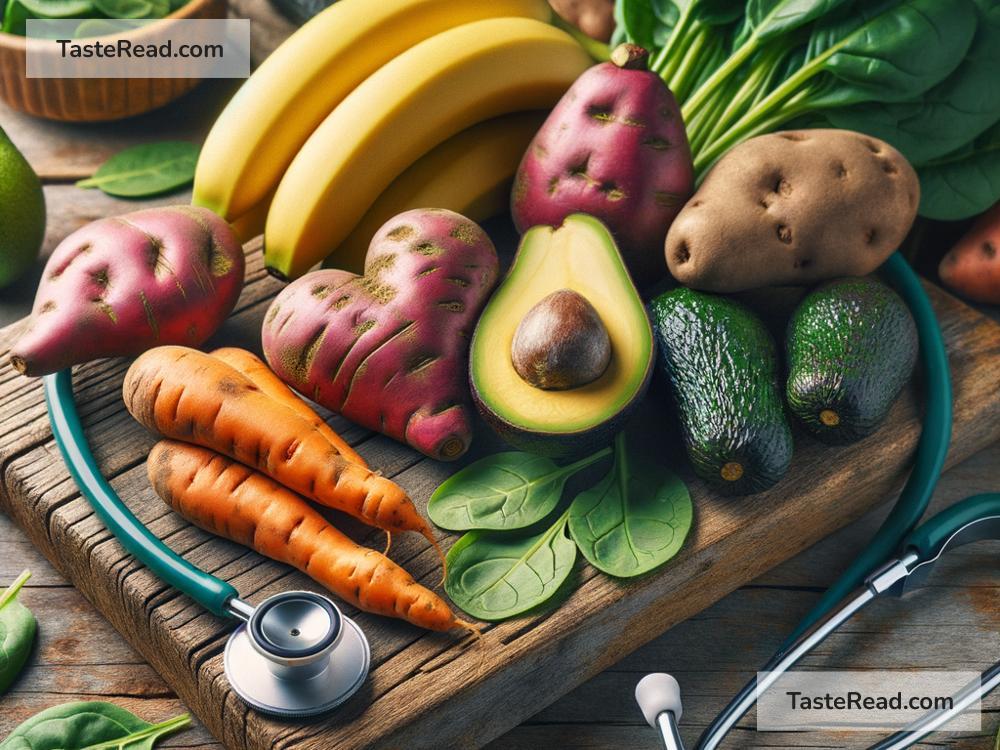The Role of Potassium in Heart Health
If you’ve ever heard someone say that bananas are good for your heart, they’re not wrong! The reason behind this claim lies in a special mineral called potassium. Potassium is an essential nutrient that plays a key role in keeping our bodies healthy—especially when it comes to heart health. In this blog, we’ll explore what potassium is, how it helps your heart, why a balanced potassium intake is crucial, and how to include potassium-rich foods in your diet.
What is Potassium?
Potassium is a mineral found in many foods and is considered an electrolyte. Electrolytes are substances that help your body maintain fluid balance and conduct electrical signals. These signals are particularly important for muscle contractions, like the ones in your heart. Potassium helps keep your heartbeat steady and supports other important functions in your body such as nerve signaling and muscle movements.
Our bodies don’t produce potassium on their own, so we need to get it from the food we eat. Luckily, potassium is found in lots of delicious fruits, vegetables, and other foods. But why is it so important for heart health? Let’s dig deeper.
Why is Potassium Important for Your Heart?
Your heart is an incredible organ—it pumps blood through your body nonstop, delivering oxygen and nutrients to your cells. For your heart to work effectively, it relies on a delicate balance of electrolytes, including potassium. Here are some of the ways potassium supports heart health:
1. Keeps Blood Pressure in Check
One of potassium’s biggest jobs is helping to control blood pressure. High blood pressure, also known as hypertension, is a major risk factor for heart disease. Potassium works by balancing the amount of sodium in your body. When you have too much sodium (found in salt), it can make your blood vessels tighten and raise your blood pressure. Potassium helps counteract this by relaxing your blood vessels and helping your kidneys remove extra sodium through your urine. This process helps lower blood pressure, which reduces the strain on your heart.
2. Supports Heartbeat Stability
Your heart’s rhythm is controlled by electrical impulses, and potassium plays a vital role in this process. Too little potassium (or too much) can disturb your heart’s electrical signals, potentially leading to irregular heartbeats, known as arrhythmias. Ensuring you have enough potassium in your diet helps keep your heart beating steadily.
3. Reduces Risk of Heart Disease
Studies show that consuming enough potassium is linked to a lower risk of heart disease and stroke. By helping to maintain healthy blood pressure levels and heart rhythm, potassium contributes to overall heart health.
Signs of Too Little Potassium
If your body doesn’t get enough potassium, it can lead to a condition called hypokalemia. Symptoms of hypokalemia include weakness, fatigue, muscle cramps, and irregular heartbeats. Severe potassium deficiency can be dangerous and needs medical attention. While potassium deficiency is rare for most healthy people who eat a balanced diet, certain factors—like excessive sweating, kidney problems, or using diuretics (medications that remove excess fluid)—can increase the risk.
Signs of Too Much Potassium
On the flip side, having too much potassium in your body (known as hyperkalemia) can also be harmful. Excess potassium can disrupt your heart rhythm, so people with kidney problems or those taking certain medications should be cautious with their potassium intake. It’s always good to talk to your doctor if you’re unsure about how much potassium you need.
How Much Potassium Do You Need?
The recommended daily intake of potassium for adults is around 2,500-3,500 milligrams per day, depending on your age, sex, and activity level. Most people can meet this requirement through a balanced diet that includes potassium-rich foods.
Best Potassium-Rich Foods for Heart Health
The good news is that potassium is found in many foods, so it’s easy to add to your meals. Here are some excellent sources of potassium:
- Fruits: Bananas, oranges, melons (like cantaloupe), strawberries, and avocados are all potassium-packed.
- Vegetables: Sweet potatoes, spinach, broccoli, tomatoes, and potatoes.
- Beans and Legumes: Lentils, kidney beans, and black beans.
- Dairy: Milk and yogurt.
- Fish: Salmon, tuna, and halibut.
- Nuts and Seeds: Almonds, pistachios, and sunflower seeds.
Pro tip: Instead of reaching for salty snacks like chips, grab a handful of potassium-rich almonds or slice up an avocado to keep your snack heart-healthy!
How to Include Potassium in Your Diet
Adding potassium to your diet doesn’t have to be complicated. Here are some easy ways:
- Start your morning with a banana or a smoothie made from spinach and berries.
- Swap white rice or pasta for a baked sweet potato at lunch or dinner.
- Snack on unsalted nuts or yogurt between meals.
- Include beans or lentils in soups, salads, or casseroles.
- Add leafy greens like spinach or kale to your meals—the more veggies, the better!
Final Thoughts
Potassium is a heart-friendly mineral that plays a key role in managing blood pressure, supporting a steady heartbeat, and reducing the risk of heart disease. By including potassium-rich foods in your daily meals, you’re taking an important step toward keeping your heart healthy and strong.
Remember, balance is key—not just in your diet but also in the nutrients your body needs. If you’re concerned about your potassium levels or heart health, always seek advice from your doctor or a registered dietitian. Your heart works hard for you—so take care of it by fueling your body with the nutrients it needs!


